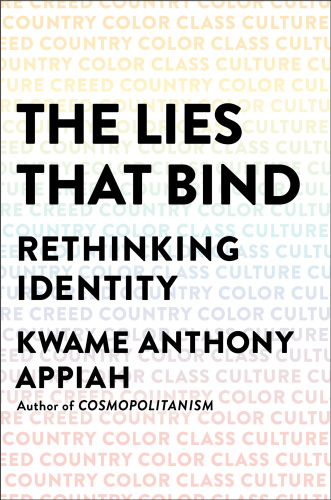
The Lies that Bind
Rethinking Identity
کتاب های مرتبط
- اطلاعات
- نقد و بررسی
- دیدگاه کاربران
نقد و بررسی

March 1, 2018
Whether based on nationality, class, culture, race, and/or religion, identity is seen today as a main source of various conflicts worldwide. But NYU philosophy and law professor Appiah, author of the prize-winning Cosmopolitanism and the "Ethicist" column for the New York Times, begs to differ. Pointing to discarded or ineffectual concepts of race, nation, and the West, he argues that identity isn't the cause but the result of these conflicts. Appiah expands on his 2016 BBC Reith Lectures to deliver something timely; look for a five-city tour to New York, Los Angeles, Chicago, Boston, and Washington, DC.
Copyright 2018 Library Journal, LLC Used with permission.

June 18, 2018
The supposedly eternal categories people use to group themselves into antagonistic collectives are misleading memes of recent vintage, according to this probing critique of identity politics. New York University philosophy professor Appiah (Cosmopolitanisms) argues that, although people have an innate “clannishness”—an instinct to identify with groups—the common essential properties that bind those groups are arbitrary, inconsistent, and mainly imaginary. The idea of fixed biological races, he contends, developed in the 18th century to justify the transatlantic slave trade; the notion of homogeneous national identities sprouted from a 19th-century romantic philosophy that forced them onto multiethnic, multilingual communities; modern religious divisions are based on contradictory, often unintelligible scriptures; and, contrary to the dicta of both white nationalists and Afrocentrists, Western culture isn’t the creation of Europeans, Egyptians, or any other single people. Writing in erudite but engaging prose, Appiah spotlights figures who created identitarian doctrines or challenged them, including a West African boy who traveled to Germany in 1707 and became a philosophy professor, and ponders his own complicated identity as a gay, biracial man descended from English knights on his mother’s side and Ghanaian royalty on his father’s. With deep learning and incisive reasoning, Appiah makes a forceful argument for building identity from individual aspirations rather than exclusionary dogmas.

June 15, 2018
In an exploration of the ways we label and confine ourselves, a celebrated philosopher advocates for a theory of human identity that recognizes but transcends race, religion, nation, culture, and class.Repudiating today's misguided surge of nationalism and nativist "purity," Appiah (Philosophy and Law/New York Univ.; As If: Idealization and Ideals, 2017, etc.) provides an impeccably argued challenge to all manner of calcified identities, including the illusory notion of "Western" civilization. "The East" is no less a chimera. Broadly, the author insists that we are bound by ways of apprehending identities that took modern shape in the 19th century, and they demand re-evaluation. Appiah makes irrefutable points about the incoherence of narrowly defined identities and our collective delusions. However, he dithers a bit in his opening essays, splitting hairs and taking a chapter to express what could have been managed in 300 words. Indeed, the book often relates the obvious in exhaustive terms, and the author sometimes ends up preaching to the choir. While eviscerating much pseudo-science, he also parrots some of the more questionable contentions of academic ideologues, succumbing to their oversimplifications. Still, the author has a penetrating grasp of the complexities of identity, and he wields history like a scalpel, extracting the cancerous myths, poisonous prejudices, and foolish antagonisms that divide us. Though Appiah savors his entwined Asante and English heritage, he is, like Diogenes, a citizen of the world, and his intent is to build bridges. "My aim is to start conversations, not to end them," he concludes, fully acknowledging that there is much more to be said on each of the topics he investigates. Appiah knows we are clannish creatures and that the most intractable of all "isms" is tribalism. He asks only that we rethink false assumptions and find our way out of the thickets.A well-informed philosophical investigation into methods for breaking through "walls that will not let in fresh and enlivening air."
COPYRIGHT(2018) Kirkus Reviews, ALL RIGHTS RESERVED.

























دیدگاه کاربران